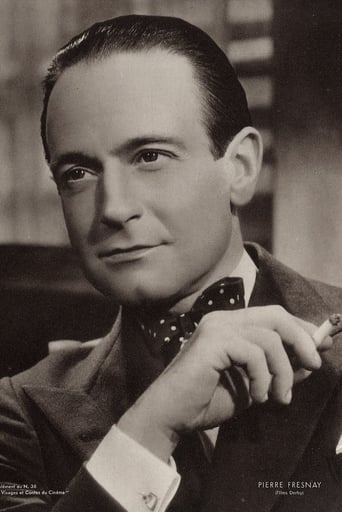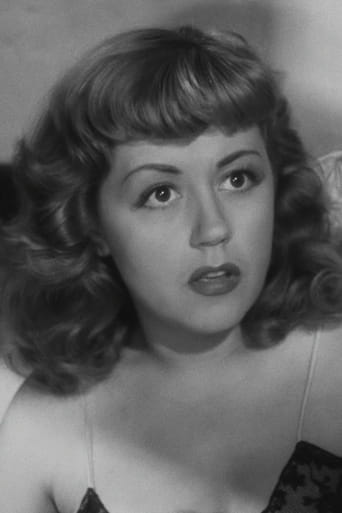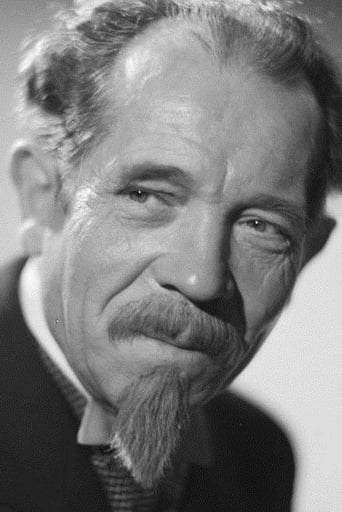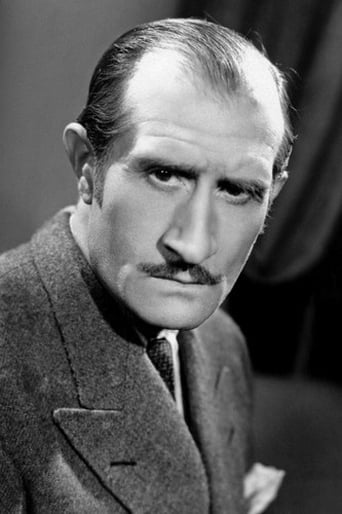Exoticalot
People are voting emotionally.
Plustown
A lot of perfectly good film show their cards early, establish a unique premise and let the audience explore a topic at a leisurely pace, without much in terms of surprise. this film is not one of those films.
Tayyab Torres
Strong acting helps the film overcome an uncertain premise and create characters that hold our attention absolutely.
Allison Davies
The film never slows down or bores, plunging from one harrowing sequence to the next.
ElMaruecan82
And just when I thought the title worked like a final revelation, it just ended up being the starter of the second act of Henri-George Clouzot's classic film's debut… which makes sense. Why would you tell right from the start where the villain lives except if the 21 number is a very broad information, like the location of a seedy pension occupied by people who doesn't strike as the most recommendable ones. There are obviously four or five potential murderers and the trick is to know 'who done it'?And whodunit is the word, as the film opens with a murder that is as violent and merciless as it's cleverly shot. A bum who's just won at the lottery spent the whole time buying drinks and bragging about things he doesn't have the slightest notion about, the bar opening allows us to have a few discussions about the mysterious serial killer who torments Parisian street (maybe a nod to a villainous regime that brandished its flag on the Eiffel Tower). The killer's trademark is to leave mysterious cards with the name 'Monsieur Durand', but totally oblivious to the threats, the imbibed hobo goes his way home Then, in a nice technical twist, a banal traveling shot took more dramatic proportion, the man walked faster as if he tried to escape from the camera, instantly marking the villain's POV.Clouzot has often been referred as the second Hitchcock and I suspect this has more or less to do with his 'smaller' (in quantity but not quality) body of work. But Clouzot is a legitimate Master of Suspense and the murder scene would have made Hitch very proud, and the two men have more in common than the use of suspense and tricky shots, they had some dark sense of humor. Clouzot's humor would confine to cynicism and a rather pessimistic take on human nature, but aftermath scenes are oddly lighthearted and funny. The last killing being one too many, it threatened the Ministry of Interior's position, so we witness a series of orders' transfer from one hierarchy to another, and the lower the status is, the smaller the delay and the less polite the injunction. It all ends with Detective Wens (Pierre Fresnay) having two days to investigate the murder.The movie loses its way a little for exposition's sake, so we get to know Wens' noisy girlfriend, a wannabe stage artist named Mila and played by Suzy Delair (who was the voluptuous singer in "Quai des Orfèvres"), she hears from a manager that he only hires people who make the headlines, so for some reason, she decides to look for the mysterious murderer. That doesn't really make sense, nor the fact that the two leads are too opposite to satisfy as a couple. Fresnay plays a sort of French version Sherlock Holmes, (the original play was actually set in London), he's sophisticated and histrionic while Mila is more of a popular street-smart Parisian girl. Thankfully, the film promptly gets to the point where a snitch reveals where the murderer lives.So Wens enters the pension, disguised as a pastor, and discovers some odds but colorful occupants many of them, like Fresnay and Delair are Clouzot regulars and it's one of the film's delights to see them interact and compete in terms of nastiness. The obligatory Pierre Marquay is Collin, a man who manufactures headless puppets as tributes to the criminal, Noel Roquevert, who played nicer and more gentlemanly persons, is an embittered doctor with a criminal record, and Jean Tissier is Professor Lallah-Poor, a turban-wearing master of illusions, there's also a blind ex-boxer with a beautiful nurse (Huguette Vivier), a wannabe writer (Maximilienne), an overweight manager and a janitor who spends time whistling and imitating animal sounds.At that point, you expect the rest of the film to go like these one-location Agatha Christie-like mysteries novels, enjoying the delightful exchanges and the great performances from all the protagonists until Wens spots the guilty one. Speaking of this, I thought Fresnay as the ringmaster played his part in a s slightly over-the-top way, even when he's not supposed to act in the film, he would be more restrained and dramatic in Clouzot's next film "Le Corbeau") but this is a minor flaw, easy to overlook. If you love a movie to go beyond your expectations, to give you a little more than what you expect, this is the film. And it all occurs in that great third act.Not only it provides a satisfying resolution to the plot, but also a very clever one, that should have inspired a Hitchcock movie without even him being accused of plagiarizing. As a matter of fact, the plot is so original that I can't recall a famous movie working on the same basis. And originality is certainly one of Clouzot's strongest suits, as his equally suspenseful and thrilling movies never relies on the same schemes and they always manage to wow the audience, while making an interesting social commentary on a specific business or demography of French society, here it can be argued that the Police isn't shown under the kindest light, which in the context of occupied France, makes sense.Speaking of the Occupation, I found the concluding shot rather puzzling until I discovered it was one of the greatest finger gestures toward the Nazi occupants, which also proves where Clouzot stood for and it went unnoticed by censors because it was both ingenuous and subtle; and so full of promises of the emerging talent of a director whose legacy has so much been overshadowed by Hitchcock.
vogonify
What a smart film this is! It took me a while to get around after the proverbial rug was pulled from under my feet towards its climax. It is a thriller, but not just that. It is a comedy, but never distracting from the overall tone. It is intelligent, but doesn't take a cheat breather at the end to cover up writing inadequacies. A policeman has to catch a serial killer in two days. He has for company an ambitious woman who is far from qualified to be in situations she intends to be in. He has a clue. And he has a set of strange people amongst whom he feels he has his target. A fabulous whodunit ensues. Add to this the beautiful language of the French in what is a fairly verbose film, and you have an absolute must- see. Along with Laura, this is one of my favourite suspense thrillers from the 40s and I definitely recommend it.
GManfred
I often wish I could speak French, especially when watching a French movie billed as a mystery/comedy. I can't seem to get my funny bone around the Gallic sense of humor - unless the sub-titles are doing me in. I thought "The Murderer Lives At #21" was a good, worthwhile mystery movie, one which was unsolvable until the end of the picture. I thought Pierre Fresnay was a very good Inspector Wens and I wished there could have been a whole series of Insp. Wens films. I recall that he played the sympathetic part of Capt. Boeldieu in "Grand Illusion", and I have a recording of him in a 1936 Cole Porter musical (he spoke but did not sing).But why did the aura of menace disappear after the first murder? I really thought we were in for a special treat at that point. I liked the motley collection of suspects at the boarding house but none of them were menacing or threatening, just a peculiar group of people. Suzy Delair's presence is marginally grating, just as it was in "Quai Des Orfevres", and once again regaled us with a forgettable song or two. Someone mentioned the chemistry between Fresnay and Delair was reminiscent of Nick and Nora Charles. That may be so, but as I stated much of the playful banter was lost due to the language barrier. Moreover, I was never a fan of attempts to mix comedy and mystery, which was prevalent up until WW II. I don't think they blend well as one element tends to cancel out the other. This could be the reason for the aforementioned disappearance of the aura of menace.I gave this picture a rating of 7. The comparison between Clouzot and Hitchcock was not yet a valid one; at this point Hitchcock could mop the floor with the neophyte Clouzot.
Alice Liddel
Henri-Georges Clouzot is generally considered cinema's master of misanthropy, with 'Le Corbeau', 'Les Diaboliques' and 'The wages of fear' standing as damning testaments to all that is mean and ugly in human nature. 'L'assassin habite au 21' may surprise fans of his work with its light, parodic tone. The assassin is M. Durand, an unseen serial killer who always leaves his calling card at the scene of the crime. Durand is not just elusive, but seems to be able to be in all places at all times. Political pressure is put on the police to get to the bottom of the case, with Inspecteur Wenceslas 'Wens' Vorobechik, a dandy living in an unexpectedly plush, Astaire and Rogers-type house, complete with maid, and live-in lover, the brash Mila Milou, a slappy Jeanette MacDonald-wannabe desperate for a job. A tip-off leads Wens to a boarding house, peopled by a rare band of eccentrics (an elderly unpublished authoress, a disgraced abortionist, a magician, an artisan, the landlady, and a bizarre butler who does animal impressions). Wens disguises himself as a pastor to try and uncover the murderer, but every time he thinks he's caught the murderer, another homicide takes place.From the very first shot, a spookily creaking door overemphasised by the music and shut be an indifferent barman, we know we're closer to the comic-fantasy crime world of Carne's 'Drole de drame' than any of Clouzot's later, bleakly inexorable classics. The pantomime aspect of the plot, with its suave killer, eccentric suspects, foppish investigator, is emphasised by the references to theatre throughout - Mila's singing; Wens' disguise; the soirees at 21; the magician's elaborate room and show (framing an excellent murder); and the final concert that provides background for the climax. Fun is also to be had in the bickering between the central lovers, and the spineless buck-passing within the police force.This last gives a clue to the film's true worth. 'L'assassin' was produced during the Nazi Occupation of France, a difficult time for Clouzot, whose next film, the savagely satiric 'Le Corbeau', was denounced by the Resistance as pro-Nazi. It might seem jarring to see comically buffoonish policemen, when we know outside the cinemas the Gestapo are out collecting fodder for concentration camps, but Clouzot manages to smuggle in darker truths. The opening murder, where the drunken lottery-winner is relentlessly stalked and finally stabbed, is shot, unedited, from the point of view of the killer, and so may be the first slasher sequence in movies; but a film where the camera has been the authority, the equivalent of the third person narrator in a novel, and the point of view has been usurped by a faceless, undefeatable killer, randomly slaughtering in a familiar environment, has obvious resonance in a France under the terror of the Nazis.Ditto the plot resolution. The narrative, albeit comically, utilises the old-fashioned puzzle format (e.g. Agatha Christie), where crime is concentrated in an artificial setting, is rooted out by a clever detective, restoring order. In Clouzot's film, it's not just a fact that every one's a suspect: every suspect is a killer. Again, in a France where good bourgeoises were informing daily on their neighbours, Clouzot's film or solution isn't very far-fetched. The 'singular' assassin of the title looked at this way is not a deception, but a finger pointed at the whole of France, just as 'Le Corbeau' would a year later.





